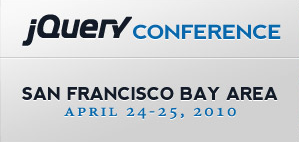jQuery 1.4.3 is now out! This is the third minor release on top of jQuery 1.4, fixing some bugs and landing some nice improvements.
I would like to thank the following community members that provided patches and input for this release: Anton M., Justin Meyer, Colin Snover, Ryan Tenney, Louis-Rémi Babé, David Petersen, Rick Waldron, Dave Reed, John-David Dalton, temp01, Heungsub Lee, J. Ryan Stinnett, Robert Katic, Juriy Zaytsev, James Burke, Jeffery To, Carl Fürstenberg, Jacob Wright, Jeff Robinson, Christian C. Salvadó, Andrée Hasson, Jason Webster, Dave Furfero, Adam Sontag, Travis Hardiman, DBJDBJ, and Ben Alman.
Along with the following jQuery team members: Scott González, Brandon Aaron, Yehuda Katz, Dave Methvin, Karl Swedberg, Paul Irish, Ralph Whitbeck, Jörn Zaefferer, Richard Worth, Doug Neiner, and Mike Alsup.
Downloading
As usual, we provide two copies of jQuery, one minified (we now use the Google Closure Compiler as the default minifier) and one uncompressed (for debugging or reading).
- jQuery Minified (26kb Gzipped)
- jQuery Regular (179kb)
You can feel free to include the above URLs directly into your site and you will get the full performance benefits of a quickly-loading jQuery.
Additionally you can also load the URLs directly from Google’s CDN:
General Improvements
We’ve made a number of improvements to the internals of jQuery and to the guidelines that we use for development.
JSLint
To start jQuery is now passing Douglas Crockford’s JSLint tool. We’ve integrated his tool into our workflow (checking out jQuery from Github and running ‘make lint’ will show the results) – giving us the ability to keep on top of possible regressions.
We’ve made a few minor changes to JSLint to suit our particular development style and have documented the results in the jQuery Core Style Guidelines.
Modularity
We’ve also removed a number of the inter-dependencies that exist in the jQuery source (inbetween modules). Doing this allows for a greater amount of flexibility when using a copy of jQuery from source. For example you could now use a script loader, such as LABjs or RequireJS to dynamically load individual jQuery modules (e.g. core, support, data, and events).
Additionally this change has made it so that you no longer need to build a copy of jQuery in order to run the jQuery test suite. This has dramatically improved our development workflow – allowing us to quickly make changes to jQuery and test the results without a (comparatively) slow build step.
New Features
All new features and changes can be found in the jQuery API documentation for 1.4.3.
CSS Module Rewrite
Nearly the entire CSS module has been rewritten focusing entirely on extensibility. You can now write custom CSS plugins that extend the functionality provided by .css() and .animate().
For example here is a plugin written by Louis-Rémi Babé that takes advantage of the new functionality: jQuery Rotate.
The plugin provides a cross-browser means of setting and animating the rotation of DOM elements just by using the traditional jQuery methods, like so:
$('#myDiv').css('rotate', 90);
$('#myDiv').animate({rotate: 180});
During the rewrite we broke down the functionality contained within jQuery into two very clear paths: Getting and setting an element’s .style property (done through jQuery.style) and getting the current computed style information of an element (done through .css() and jQuery.css – note that jQuery.curCSS is no longer used and is deprecated as a result). The functionality provided by .css() uses both the jQuery.style and jQuery.css methods.
Making this change has allowed for some speed-ups in computed style retreival, as well – yielding results that are up to 20% faster.
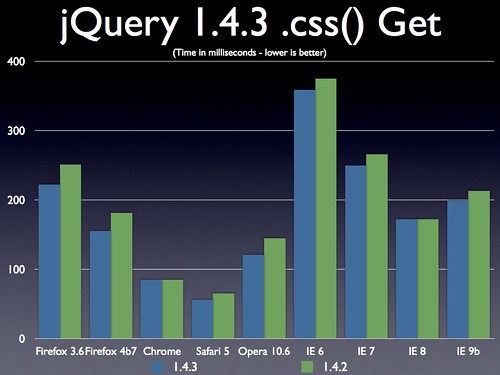
The raw data for all the performance tests can be found in the following Google Doc Spreadsheet. All tests can be found in the jQuery source repository.
Data
The data module has seen a number of improvements greatly increasing its utility.
HTML 5 data- Atributes
To start the primary functionality provided by the jQuery Metadata plugin has been moved into core. HTML 5 data- attributes will be automatically pulled in to jQuery’s data object.
For example, given the following HTML:
<div data-role="page" data-hidden="true" data-options='{"name":"John"}'></div>
All of the following jQuery code will work.
$("div").data("role") === "page";
$("div").data("hidden") === true;
$("div").data("options").name === "John";
Note that strings are left intact while JavaScript values are converted to their associated value (this includes booleans, numbers, objects, arrays, and null).
The data- attributes are pulled in the first time the data property is accessed and then are no longer accessed or mutated (all data values are then stored internally in jQuery).
JavaScript Objects
A number of changes were made to when .data() is used on JavaScript objects (or, more accurately, anything that isn’t a DOM node). To start whenever you set data on a JavaScript object the data is set directly on the object – instead of going into the internal data object store. Additionally events that are attached to objects are put in a new ‘__events__’ property that is actually a function. This was done to allow events to be attached directly to an object, be garbage collected when the object is collected, and not be serialized by a JSON serializer. These changes should make jQuery’s data and event systems much more useful on JavaScript objects.
Events
jQuery has already had setData and getData events (which are broadcast whenever data is set or gotten through the .data() method) – overriding these methods makes it possible to override the default behavior for those features (namely you can return a different value or prevent a value from being set. Note that in jQuery 1.4.3 these events no longer bubble (allowing them to bubble proved to be too costly in most applications).
In 1.4.3 we’ve introduced a new event called changeData. This event is fired after any individual data properties are changed when using .data(). For example:
var user = new User();
$(user).bind("changeData", function( event, name, value ) {
$("#user").find("#" + name).val( value );
});
The changeData event is used extensively by the new jQuery Data Linking plugin. It makes it possible for the data API to synchronize setting of JavaScript object properties with form fields.
Misc
There was one minor API change to .data() in 1.4.3: Calling .data(Object) no longer completely replaces the data object instead it extends the existing object, leaving the unspecified values in place. We found this to be the expected result based upon a number of confused bug reports.
Traversing
The performance of nearly all the major traversal methods has been drastically improved. .closest(), .filter() (and as a result, .is()), and .find() have all been greatly improved.
These improvements were largely the result of making greater use of the browsers querySelectorAll and matchesSelector methods (should they exist). The jQuery project petitioned the browsers to add the new matchesSelector method (writing up a test suite, talking with vendors, and filing bugs) and the whole community gets to reap the excellent performance benefits now.
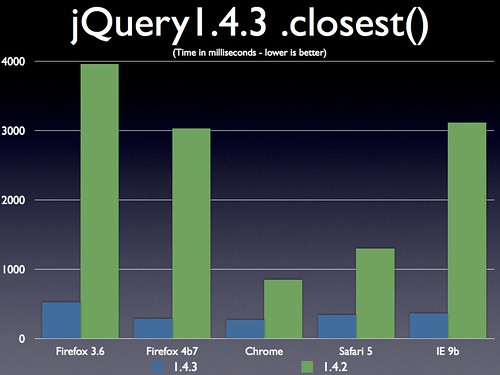
The raw data for all the performance tests can be found in the following Google Doc Spreadsheet. All tests can be found in the jQuery source repository.
The above performance results specifically look at three very common cases in jQuery code: Using .closest() on a single DOM node, using .filter() (or .is()) on a single DOM node, and using .find() rooted on a DOM element (e.g. $(“#test”).find(“something”)).
Note that the the browsers shown are those that actually support querySelectorAll or matchesSelector – existing browsers that don’t support those methods continue to have the same performance characteristics.
Ajax
A few new Ajax features have landed which should help plugin authors and those building progressively-enhanceable applications.
A new jQuery.readyWait property has been introduced which, when added to, delays the execution of the ready event. This should be used by plugins that wish to delay the ready event from occurring until a specified time. For example RequireJS has already implemented the use of this property allowing you to load dependencies that should be handled before the ready event fires. Whenever an item finishes loading you should end up calling jQuery.ready(true) (and if all dependencies are finished loading – and the DOM is ready – then the ready event will fire).
We’ve also added a new support property: jQuery.support.ajax. Simply this returns true in browsers that are capable of handling an ‘Ajax’ (XMLHttpRequest) request.
Events
.bind(“click”, false) and .unbind(“click”, false)
A convenient shortcut for binding a function that does nothing but return false (preventing the default action and stopping the event bubbling).
.click(data, fn)
All built-in event methods (such as .click()) now accept data as an initial argument (much like the bind method does).
A new property of the event object that contains the event namespace that was passed in to .trigger().
Effects
.show(speed, easing, callback), etc.
All animate methods now support easing. Much like how .animate() supports an easing argument (to be utilized by an easing plugin)
A new property that exposes the rate at which all effects fire (in milliseconds – defaults to 13). Making this number smaller will make animations smoother in some browsers (such as Chrome) at the expense of CPU.
Misc
Determine the internal JavaScript [[Class]] of an object. A number of different aspects are utilized to determine the exact return value for an object. The logic can be determined as follows:
- If the object is undefined or null then “undefined” or “null” is returned accordingly.
- If the object has an internal [[Class]] equivalent to one of the browser’s built-in objects we return the associated name. (More details about this technique.)
- jQuery.type(true) === “boolean”
- jQuery.type(3) === “number”
- jQuery.type(“test”) === “string”
- jQuery.type(function(){}) === “function”
- jQuery.type([]) === “array”
- jQuery.type(new Date()) === “date”
- jQuery.type(/test/) === “regexp”
- Everything else will return “object” as its type.
A simple method for determining if an object is likely to be a window.
jQuery.isWindow(window); // true
Additionally we now use he native Array.isArray method for jQuery’s isArray (if available) and we utilize the native String trim method provided by the browser (again, if available). A number of performance improvements were made to jQuery.trim, detailed in the following thread.
Testing
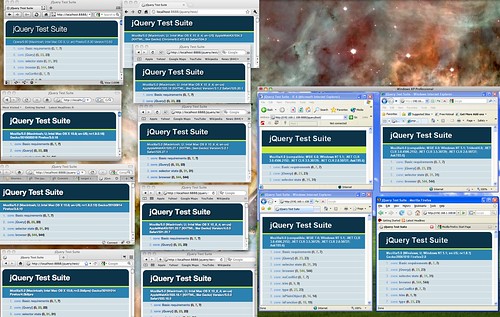
jQuery 1.4.3 is passing 3621 tests on all supported browsers. We’re 100% passing on Firefox 4 and nearly passing in IE 9 (we discovered two bugs, filed them, and one of them has already been fixed).
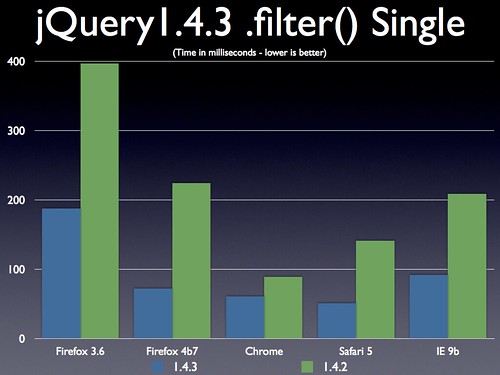
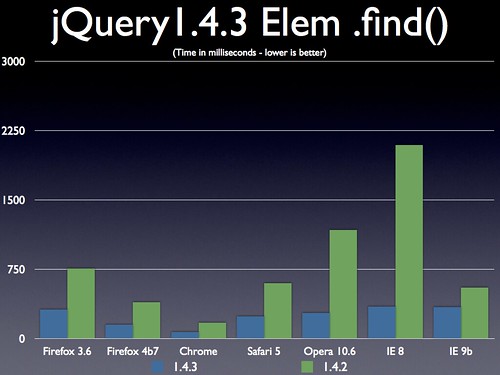

 We’d like to open up
We’d like to open up 